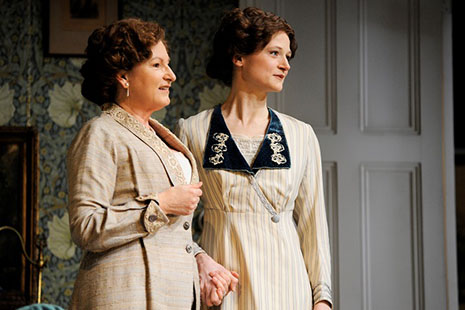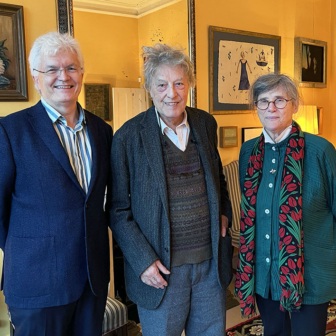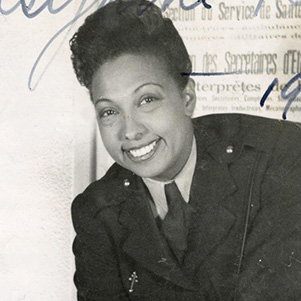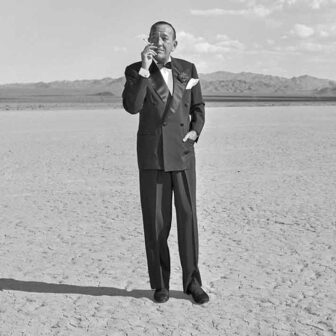LAST YEAR, David Hare and Terence Rattigan were occupying the same theatre with the double bill of The Browning Version and, commissioned by the Rattigan Estate, Hare’s South Downs. This year each has a theatre to himself: Hare’s 1998 exploration of the painful drama of Oscar Wilde’s last years, The Judas Kiss, in Australian Neil Armfield’s fine production, is drawing full houses at the Duke of York’s, while one of Rattigan’s greatest hits, The Winslow Boy, is enjoying a comparable success at the Old Vic. Two playwrights with ostensibly little in common in their approaches show that they tackle related issues – for example, a celebrated court case and its aftermath – in ways that speak to large theatregoing audiences. At the Duchess Theatre, meanwhile, a captivating experience is billed as two new one-act plays by Alan Bennett.
Wilde and tragedy: The Judas Kiss
The life of Oscar Wilde – or key parts of it – has often been the subject of biographical examination on stage and screen. As early as 1936 Robert Morley starred in a play simply called Oscar Wilde, and he would star again in the 1960 film with the same title. In that year, though, Peter Finch won more serious critical plaudits for The Trials of Oscar Wilde, the two films released within weeks of each other. In 1997, Stephen Fry brought Wilde to the screen in the role he said he was born to play, but in the intervening decades actors including Donald Sinden, Vincent Price and Michael Gambon brought Wilde’s wit and tragedy to stage versions of his life and fall.
The Judas Kiss, critically rehabilitated now after a captious reception in 1998, places Wilde imposingly at the centre, for the most part physically as well as in terms of a culture that needs seeing to. This Wilde is a tragic figure, brought low by hypocrisy, prejudice and – the play makes clear – in a curious way his refusal to compromise his own integrity. The play is divided into two acts, and its overall impact is partly a product of how each in retrospect recalls and comments on the other. (There is an echo here of last year’s double bill, where the memory of each play reinforced the other.)
The first act is set in the Cadogan Hotel, where Wilde will await arrest for “gross indecency” and where he is obviously an honoured guest. When the play opens, a nude pair (maid and porter) emerge from the bed on stage and race off to clothe themselves. This is apparently Wilde’s bed and has been the scene of some not quite similar encounters. Robert Ross, Wilde’s former, indeed first, male lover and now a friend and a voice of sense and genuine concern, arrives, deeply anxious on Wilde’s behalf. He is followed by the posturing Lord Alfred Douglas, Wilde’s beloved Bosie, whose unfailing self-preoccupation helps to bring about Wilde’s fall. There is thus a sense of dramatic build-up to Wilde’s entrance, which Rupert Everett’s performance entirely lives up to.
This first act is set in a strangely subdued, even rather gloomy, room with an odd plushy brown swathe of curtain hanging as a sort of canopy over the polished brass bedstead, and there are comfortable chairs and a table set for a meal. Everything about the set suggests a level of comfort and discretion, while the romping servants suggest something else about the place. The set for Act Two works almost like a photographic negative of the earlier one. This time, two years after his imprisonment, he is living in penurious exile in a comfortless hotel room in Naples. The luxuriant brown hangings of Act One are replaced by flimsy white drapes, and there is now a single iron bedstead, cheap table and chairs. There is money only for brandy and for no food other than stale buns. These “reduced circumstances” offer a visual comment on what Wilde’s life has become, Dale Ferguson’s settings opting for the evocative rather than the merely realist.
Another way in which this second act recalls the first is that it also opens with two naked figures reclining on the single bed, this time observed by the now sadly aged and shabby figure of Wilde from his centre-stage chair, where he spends most of the act. Wilde’s clothing, by contrast with his still-stylish fawn suit of Act One, suggests a gondolier fallen on hard times. Bosie has joined Wilde in Naples but his loyalty cannot be counted on. With Wilde’s obvious approval, he has brought an impressively endowed Italian called Galileo (a name with which Wilde makes some play) to share his bed, but he is getting ready to desert Wilde. Ross arrives again and tries to persuade Wilde to look after himself, but by now Wilde, however aware of where Bosie’s egoistic urge to self-preservation will take him, is prepared to live out the rest of his life in the knowledge of the love he has known, however undeserving its object.
Armfield’s direction keeps the audience absorbed in what is essentially a conversation piece in mode, never letting the seriousness of the situation lapse into solemnity and allowing the glimmers of wit to lighten the painfulness of the action without letting them undermine the pain at the core.
Rattigan and triumph: The Winslow Boy
Talk about a “dance to the music of time.” Another link between these two plays is to be found in their real-life origins: the Irish barrister and politician, Sir Edward Carson, who finally won the prototype of the Winslow boy’s day in court, had won a different fame for a fierce attack on Oscar Wilde in the trial of Wilde versus Queensberry. For the purpose of this essay, it seems almost too neat but it does say something about Carson. If the Wilde trial makes him seem the archetypal illiberal conservative, he emerged very differently in the later cause célèbre.
Rattigan’s resurgence in recent decades would have been gall and wormwood to the angry young playwrights of the 1950s with their scorn, some of it undoubtedly deserved, for the middle-class values enshrined in the “well-made plays” by the likes of Rattigan, who perhaps foolishly claimed he wrote with a mythical Aunt Edna in mind. Well, time has been kind to him. The Browning Version has been much-staged, most recently last year, re-filmed in 1994 with Albert Finney, and televised in 1985 with Ian Holm and Judi Dench; The Deep Blue Sea was seen on TV in 1994 with Penelope Wilton repeating her stage role, and given a fine screen outing in 2012. Now we have The Winslow Boy reaching sell-out audiences at the Old Vic. So there’s clearly something about the Rattigan boy that merits reappraisal as the centenary of his birth was registered two years back.
Above all, perhaps, he is a master-craftsman par excellence who best defines “well-made play.” For him, structure is meaning. Nothing happens that is irrelevant to the play’s overall pattern of interacting themes and motifs, of character interplay, of drama laced with comic awareness of human frailty. What evolves from this may not be the very greatest play, but at its best, as in The Winslow Boy, it is a deeply satisfying one. First performed in 1946, it was an instant success and was eloquently filmed in 1948, televised in 1977 and filmed again, improbably but persuasively, by David Mamet, in 1999. For once that tired old legend, “inspired by a true story,” seems appropriate. “I wanted to create, not just recreate,” Rattigan once said of this play. And the story of the young naval cadet wrongly accused in 1908 of stealing a five-shilling postal order and the long struggle of his father and his legal counsel to have his case brought to court and properly aired does indeed have something of the “inspirational” about it. There is a very fine and moving account of Archer-Shee, the real-life counterpart of the Winslow boy, by American critic Alexander Woollcott in his 1943 essay collection, Long, Long Ago, and this may well have been the stimulus for Rattigan’s play. Woollcott records how the boy, his innocence proved, died a few years later after the Battle of Ypres. The Old Vic’s production moves the events on by several years, with the dates 1912, 1913 and 1914 appearing in large illuminated letters above the proscenium arch. In his act of “creating” Rattigan stresses the poignancy of individual human endeavour in the face of global upheaval, and the production reinforces this intention.
Each act moves compellingly to its own climax, while allowing the smaller dramas clustered around the central issue to make their own claims on our attention. In Act One, the curtain rises on a comfortable, well-kept sitting room, imbued with a sense of waiting for something to happen. Young Ronnie Winslow ducks in out of the rain, and is subsequently met by other members of the household who keep the news of his sacking from Osborne Naval College from his somewhat austere father. The act moves inexorably to the latter’s receiving the news, with the anticlimactic comment that he would have hoped a son of his to have “the sense to come in out of the rain.” By the time Act Two begins, Arthur Winslow is utterly committed to establishing his son’s innocence and the play’s great central moment occurs at the end of this act when the barrister, Sir Robert Morton, ends his formidable examination of Ronnie with the words, “The boy is plainly innocent,” and makes the play’s great pronouncement, “Let right be done.”
The pacing of Lindsay Posner’s production ensures that these key moments are appropriately led up to and carry the right emotional weight when they arrive. Mrs Winslow’s moment of revolt in Act Three, when, after months of making sacrifices, she bursts out with her longing for “an ordinary respectable life,” is very touching in Deborah Findlay’s finely conceived performance. Her needs are not negligible, even in the face of Arthur’s insistence that “an injustice has been done and it is going to be set right.” This is certainly true but the writing and the acting convince us that other things also matter – such as daughter Kate’s broken engagement or frivolous brother Dicky’s being forced, by the family’s increasing financial pressures, to leave his university. The great moments in the last act are spread among Violet, the loyal maid, who comes rushing in with news of the triumphant outcome of the case, Mr Winslow’s quiet, “It would appear that we’ve won,” and Sir Robert’s bringing in of the final statement.
If the matter of a five-shilling postal note seems a small one, its resonances strike one as being as real now as they ever were. It is still inspiring to watch personal integrity, a sense of what is right, refusing to allow the machinery of state or the law to brush it aside. Ronny (a lively but maybe slightly too mature Charlie Rowe) may grow tired of the whole thing (he’s at the movies when the verdict is handed down) and Mrs Winslow’s nerves may be worn, but the father and suffragette daughter know that crucial principles are at stake. The right to be heard, for the truth to be teased out, for a name to be cleared: these have been worth the long and bitter struggle. As Sir Robert Morton says near the end, “It is very easy to do justice; it is very hard to do right.”
The current Old Vic company has no weak links, and this is indeed a play that gives everyone a chance to shine, however briefly. We may come away remembering most vividly Sir Robert, Mr Winslow and Kate but the others – the silly lady journalist gushing about the curtains, Kate’s uptight suitor and the family lawyer who would happily replace him, and the diminutive maid Violet (an eye-catching turn from Wendy Nottingham, brisk of tone and movement) – all have their moments and make them tell. Peter Sullivan, recently the corrupt police officer in TV’s The Hour, is a properly charismatic Sir Robert, and Naomi Fredrick compellingly combines tenderness and political rigour as Kate, but it is Henry Goodman’s Arthur Winslow, ageing before our eyes without losing a jot of commitment to the cause of right, who haunts the mind and the memory.
Osborne and those other iconoclasts of fifty years ago may have nudged Rattigan to one side back then. Maybe he does appeal most strongly to middle-class sensibilities, and English ones at that, but these aren’t necessarily always wrong.
Bennett remembers: Untold Stories
Perhaps the most wholly successful of the three productions I’ve managed to see (and “managed” is the word, as several others I also wanted to fit in were selfishly booked out before I could stake my claim) is Alan Bennett’s… what? I suppose you could say the program at the Duchess Theatre consists of two one-act plays, but that isn’t how they felt at the time. They are really reminiscences of his childhood and his parents, subtly shaped, but not in the usual way of climaxes and turning points. Bennett had written about them before but has now turned those recollections into a kind of drama. All that Untold Stories has in common with The Judas Tree and The Winslow Boy is that, like them, it draws on real-life material, but the way it goes about this is wholly different – and entirely beguiling.
The first and shorter of these two explorations of time past is called starkly Hymn, and it opens with a string quartet playing on the stage for a few minutes before Bennett (Alex Jennings) enters, in late middle age, respectably dressed in grey tweed jacket, with jumper and tie. He sings “And so through all the length of days/ Thy goodness faileth never,” which he’d sung at his Leeds school assemblies, from Hymns Ancient and Modern. His point is that “the words come unbidden, known but never learnt,” that childhood remains embedded in us however unexciting and unsatisfactory it may have seemed at the time.
His father (Jeff Rawle) is a man of quiet aspiration. With his large butcher’s hands, he has had an instinct for the violin which he quite fails to transfer to his son, who has then a sense of being “a disappointment to my father” only partly because he proves hopeless at the violin (one of the string quartet on stage enacts this scratchy inadequacy). Dad Bennett’s aspirations take two other forms about which Alan remembers his Mam’s (Gabrielle Lloyd) being a bit sardonic: his manufacture of herb beer leads to an explosion in the scullery (“taking on Tetley” is Mam’s assessment) and his taking up of the double bass in hope of joining a dance band is, in Mam’s words, “his Geraldo phase.”
Alan, who was never going to be musically adept as a performer, recalls two famous conductors he heard – Malcolm Sargent and John Barbirolli. The distinction he makes between them may suggest the precision with which these memories are put before us: whereas Barbirolli “served” the music, Sargent merely “presented” it. And for the young Alan, who is magically before us in the older man’s words, music became part of “a moral education.”
I’ve given so much information about this half-hour play in the hope of hinting at its richness of perception and quiet wit, and the unsentimental affection that underpins Bennett’s inquiry into the childhood that has “left [him] with no baggage.” There is in Alex Jennings’s incarnation of Bennett a sense of utter absorption in someone else’s life, and at various stages of that life. The mastery of Bennett’s northern accent is so total that one forgets to admire it; it is simply part of a tour de force, the sense of which is intensified in the second and longer of the two plays.
If the violin stood for his father’s aspirations, the Cocktail Sticks of the second represent Mam’s. This play opens with Alan packing up his mother’s kitchen, she having been transferred to “a home,” suffering from depression and memory loss. In going through her kitchen cupboards, “a labour of culinary archaeology,” he finds a small, unopened tube of the eponymous refinements. For Mam, they symbolised a life of “having people round,” of drinking sherry and eating nibbles on sticks, which she’s read about in Woman’s Own but never had. She’s never even been to “coffee mornings,” and accuses Dad with, “You won’t even try to be sophisticated.”
As Bennett moves in and out of various periods, the past and present becoming blurred, he asks the old Mam, “Why did I have no childhood?” She comes up with – fondly, not at all querulously – “You never went short. And we did take you to Morecambe.” His parents were, he concedes, “a lovely couple – unless you were their son.” It is hard to give a sense of the tone of these questionings, except to say that they are posed utterly without bitterness or patronage but just from an urge to understand, to find answers. He talks on stage to his Mam and Dad long after they are dead, looking for answers to questions he couldn’t have asked while they were alive. For example, about the occasion when he was sexually interfered with in a cinema at age ten: “You can’t be embarrassed now. You’re dead.” Or why did Dad weep when Alan was called up for National Service? And matters of class surface as he recalls his own embarrassment when his parents visited him at Oxford.
“You don’t put yourself into your writing, you find yourself in it,” the older Bennett now realises. And Untold Stories, as book and now as play, exemplifies just this process. There is a poignancy almost unbearable in its understated dealings with the ways of families, with for instance Mam finally getting her “cocktail party” as the mourners gather after her funeral. Not merely Jennings, on stage for the full two hours, but also Rawle and Lloyd play with wonderful precision and unaffected truth to and respect for the lives they inhabit.
This is a play (sort of) of such richness that you want to go on quoting from it. It draws not just on Bennett’s early Yorkshire life, the sense of wanting – to quote another of his books – “a life like other people’s” – but on what came after at various key points. This hugely prolific author is here focusing with all the empathy he can muster on his parents and the life they made for him so that he could then go on to shape one of his own. •




